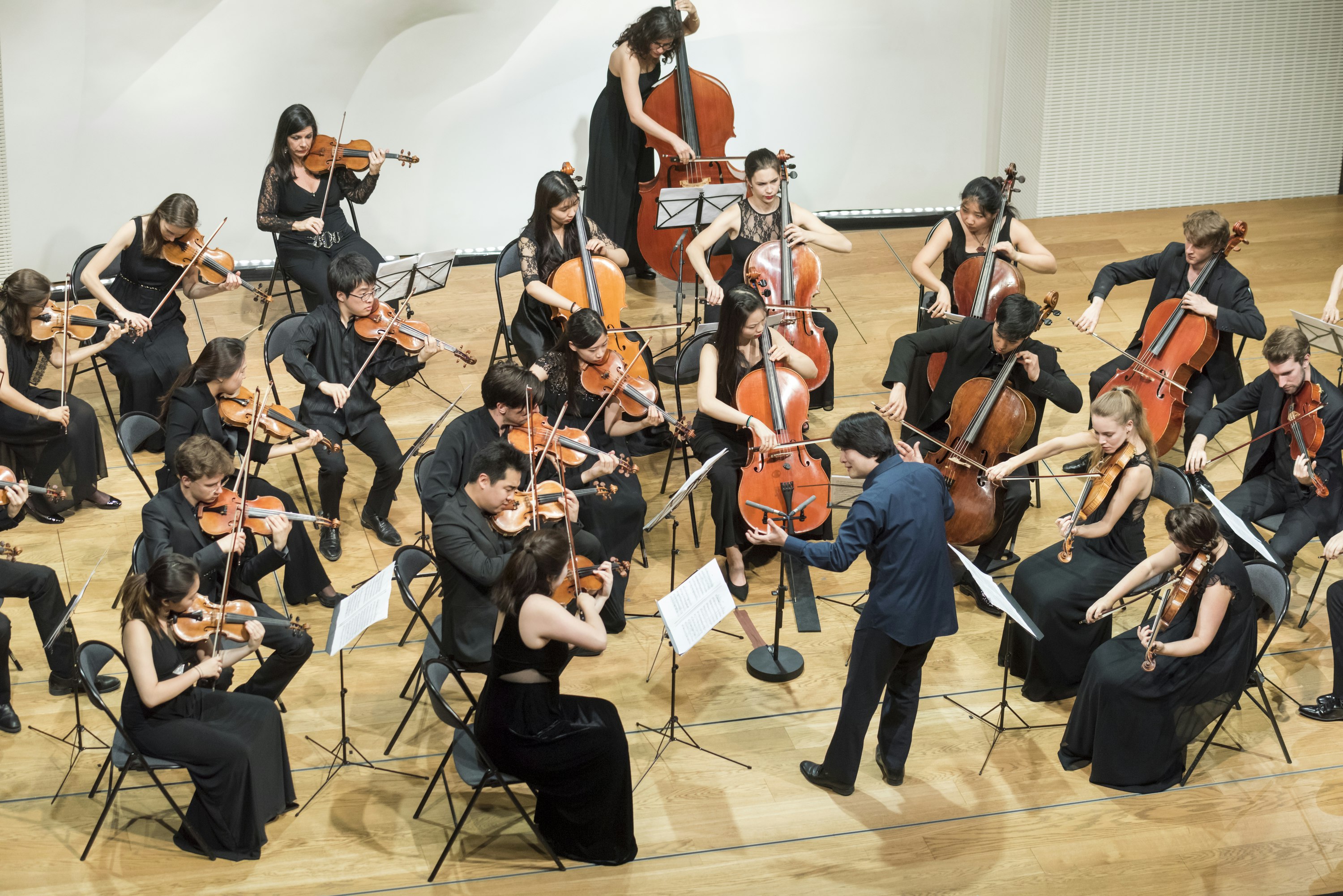Seiji Ozawa International Academy Switzerland

© Nicolas Lieber
- Date
- 16 April 2016 – 4pm
- Place
- Auditorium
On 16 April 2016, the Fondation Louis Vuitton will be again playing host to the Seiji Ozawa International Academy Switzerland. On the agenda is a masterclass open to the public featuring a string quartet directed by Sadao Harada and an open orchestra rehearsal conducted by Seiji Ozawa.
"It is fascinating to see how young artists progress in such little time".
La Seiji Ozawa International Academy of Switzerland
Truly passionate about teaching, Seiji Ozawa founded the International Music Academy – Switzerland, known since 2011 as the Seiji Ozawa International Academy Switzerland, at Rolle, near Geneva, in 2004.
The Seiji Ozawa concept
For Seiji Ozawa, the practice of chamber music and of the quartet in particular is vital. As the maestro sees it, the quartet constitutes the quintessence of music. When they come to write one, composers, dispensing with everything accessory and superfluous, tend to give the very best of themselves.
Working on a string quartet means the musician has to immerse himself in the intentions and style of its creator. Such preparation constitutes a key stage in a young virtuoso’s ascension to the summits of artistry.
Selection
The selection of the musicians called upon to practise their art at the highest level is naturally extremely rigorous. Directed by Blanche d’Harcourt and composed of onetime students at the Academy, the Selection Committee scours Europe all year, selecting players from flagship academies and at international competitions for young talent to take part in auditions. The final group of students is hand-picked by Seiji Ozawa himself, in collaboration with the Artistic Management and the teachers.
Teaching staff
The mission of the Academy is to transmit to the most talented instrumentalists of the younger generation what they can only gain from collective endeavour and from the demand for excellence acquired through working with the finest teachers. With this goal in mind, the Academy convenes a number of professors, all interpreters, whose international fame has been accompanied by a long experience of the pedagogy of music. They include Pamela Frank, Nobuko Imai, and Sadao Harada.
The Academy
The quartets are formed by affinity between the players and after careful consideration between Seiji Ozawa, the teachers, the instrumentalists, and the artistic direction, taking account of the style, sonority, and temperament of each prospective member. The students work in turn with each professor in the presence of Seiji Ozawa, thereby assuring they gain unique command of their art.
Concerts
Seiji Ozawa conducts the entire student ensemble at public rehearsals to which all the inhabitants of Rolle, together with guests of the Academy, are invited. A series of concerts, performed in prestigious venues such as the Victoria Hall in Geneva and the Théâtre des Champs-Élysées, Paris, marks the conclusion of the students’ attendance at the school. A concert is also held for residents of the Fondation Aigues-Vertes.
Year-long activities
The extremely committed artistic team advises the young musicians throughout their attendance, while the Geneva office oversees the organization and management of the Academy.

The artist
Seiji Ozawa
"Teaching is like a drug! Once you start, you cannot stop. Working with young musicians at a very high level fills me with joy. "
Seiji Ozawa has had an extremely impressive career. He was born in China to Japanese parents on 1 September 1935. But the Toho music school in Tokyo was where he trained in Western music. His first master, Hideo Saito, conferred to him the basic essential techniques, which then allowed Ozawa to travel to Europe and the United States, the origins of the Western music repertoire he had studied.
In 1959 he was awarded First Prize in the Besançon Competition for Young Conductors. From that point, his career took flight. Charles Münch invited him to conduct the Boston Symphony Orchestra in Tanglewood. Then Seiji Ozawa received teaching from Herbert von Karajan in Berlin before intensifying his training with Leonard Bernstein, a man who Ozawa calls a "genius". Bernstein had Ozawa join the New York Philharmonic Orchestra for its tour in Japan.
During his "American" years, Seiji Ozawa directed the Toronto Symphony Orchestra from 1965 to 1969, before being appointed conductor of the San Francisco Symphony Orchestra in 1970, a position he held until 1976. He fulfilled this role while being the official conductor of the Boston Symphony Orchestra, which he led until 2001.
Back in Europe, where he was musical director of the Vienna Opera from 2002 to 2010, Seiji Ozawa went on fostering his ties with Japan. He founded the Saito Kinen Orchestra in 1984 as a tribute to his teacher Hideo Saito.
The orchestra brings together instrumentalists from the most prestigious Western orchestras every summer for the Saito Kinen Festival in Matsumoto. In parallel, twice a year the Maestro leads the Mito Chamber Orchestra, which was founded in 1990 and features around thirty top level musicians.
The musical education of young artists is the focus of all his efforts. Seiji Ozawa is responsible for founding several academies: the Ozawa International Chamber Music Academy Okushiga and the Ongaku-Juku Academy in Japan, as well as the International Music Academy - Switzerland (IMAS) in Geneva, which has been known since 2011 as the Seiji Ozawa International Academy Switzerland.
Ever loyal to his audiences, Seiji Ozawa devotes his immense talent to his legendary performances, which make him one of this century's greatest conductors.

Public Masterclass
-
Saturday 16 April
-
4 p.m. - 6 p.m.
Conducted by Sadao Harada: String quartet with Brahms, Mendelssohn, Tchaikovsky
-
6.30 p.m. - 7 p.m.
Conducted by Seiji Ozawa: Chamber Orchestra with Bach, slow movement from the Concerto for Two Violins
-

